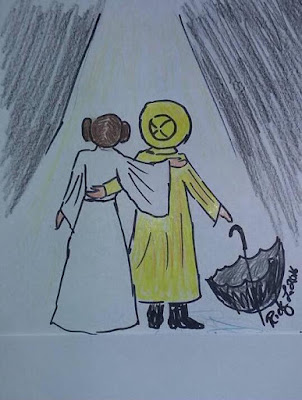
It was a pathetic sight. Sprawled across the bed in a cheap motel room in Truth or Consequences, New Mexico, crying my eyes out, I was finally admitting that he was gone. The infatuation had been deep and strong, but his soulful letters, which I lived for, had stopped coming ~ just like that, without warning. A couple of months had passed, with no word from this man who could seemingly look into my soul. I could read the writing on the mailbox: It was over, and I was devastated.
Truth or Consequences. Can you think of a better place to weep over love gone wrong?
It was August, 1977. I was 20 years old and had just finished my first summer session at a small state college in New Mexico. The two weeks before Fall Semester were supposed to be dedicated to a rendezvous with this dude. Instead, I ended up hopping on a Greyhound by myself, wandering through New Mexico. It was the start of a love affair with solo travel that has continued throughout my life.
But one other thing stands out. Before heading back to school, I went to see "Star Wars" ~ that new movie which, friends had assured me, was "science fiction, but not too science fiction-y". That's where this budding feminist met Leia, the gutsy, wonderfully snarky princess who more than held her own with the boys. Leia, who seemed to know exactly who she was. She knocked my socks off. Because I met Princess Leia at that particular time (just when I needed it), I was able to say to my heartbroken self, in a voice just above a whisper: I want to know who I am, too. I returned to school determined to do just that, with no room in my backpack for romantic infatuation.
Stay afraid, but do it anyway. What's important is the action. You don't have to wait to be confident. Just do it, and eventually the confidence will follow.
(Carrie Fisher, Interview in the Sarasota Herald Tribune, 4/20/13)
Carrie Fisher, of course, was not Princess Leia. When she played that character nearly 40 years ago, she was an emotionally insecure, 19 year-old actress, enmeshed in drug addiction and undiagnosed mental illness. What could have destroyed her served to fuel her fearless, candid spirit. She never tried to hide the messiness and pain of bipolar disorder; instead, she knew her demons well and fearlessly exposed them to the light. In doing this, she gave tremendous hope to countless people struggling with mental illness.
One of the things that baffles me (and there are quite a few) is how there can be so much lingering stigma with regards to mental illness, specifically bipolar disorder. In my opinion, living with manic depression takes a tremendous amount of balls. Not unlike a tour of Afghanistan (though the bombs and bullets, in this case, come from the inside). At times, being bipolar can be an all-consuming challenge, requiring a lot of stamina and even more courage, so if you're living with this illness and functioning at all, it's something to be proud of, not ashamed of. They should issue medals along with the steady stream of medication.
(Wishful Drinking, 2008)
Emotional breakdowns, weight gain, aging in the spotlight, undergoing electroconvulsive therapy due to crippling depression: all these challenges served to make her the brash, brutally honest person she was. She spoke out and acted up. I have loved following her over the years, reading her wry commentaries on life and the challenges of living with her illness ~ never knowing, as she once put it, "when you're going to get gob-smacked by it". When she appeared in the latest installment of Star Wars, The Force Awakens, it made my heart sing to see her as Princess (now General) Leia, a strong, competent leader who ~ Dare I say it? ~ looked her age. Carrie's response to those who felt she hadn't "aged well"?
Youth and beauty are not accomplishments. They're the temporary, happy by-products of time and/or DNA. Don't hold your breath for either.
💜💛💚💙💜💛💚💙💜💛💚💙💜💛💚💙💜💛💚💙💜💛💚💙💜
Remember the white dress I wore all through that film? George came up to me the first day of filming, took one look at the dress and said, "You can't wear a bra under that dress."
"OK, I'll bite," I said. "Why?" And he said, "Because there's no underwear in space." He said it with such conviction. Like he had been to space and looked around and he didn't see any bras or panties anywhere.
He explained, "You go into space and you become weightless. Then your body expands, but your bra doesn't, so you get strangled by your own underwear."
I think that this would make for a fantastic obituary. I tell my younger friends that no matter how I go, I want it reported that I drowned in moonlight, strangled by my own bra.

Thank you, Carrie, for living passionately and out loud. You were a force, and you made a difference.
I hope you're now dancing in that moonlight with your dear mamma.

(Ricky LaChance)
________________________________________________________________________

Era una visión patética. Ahí estaba, tirada sobre la cama en un cuarto de motel barato en Truth or Consequences, Nuevo Mexico, sollozando y por fin aceptando que él se había ido. La atracción había sido profunda y fuerte, pero sus cartas conmovedoras, que esperaba ansiosamente, habían dejado de llegar ~ así no más, sin aviso. Dos meses sin comunicación de este hombre que había mirado a las profundidades de mi alma. Podía ver que el buzón estaba vacío. Había terminado y yo estaba destrozada.
Truth or Consequences (Verdad o Consecuencias). ¿Puedes imaginar un mejor lugar para lamentar un amor que terminó mal?
Era agosto de 1977. Tenía 20 años y acababa de terminar mi primera sesión de verano en una universidad pequeña en Nuevo Mexico. Tenía planeado un rendezvous con este hombre durante esas dos semanas antes del semestre de otoño. Ya que él había desaparecido, me subí a un Greyhound (camión), a vagar por Nuevo Mexico a solas. Así empezó mi pasión por viajar sola, algo que ha seguido durante toda mi vida.
Pero destaca algo más. Antes de regresar a mis clases, fui a ver "Star Wars" ~ esa película nueva que, mis amigos me habían asegurado, era "ciencia ficción, pero no demasiado ciencia ficción". Es allí donde esta feminista joven conoció por primera vez a Leia, la princesa valiente y deliciosamente sarcástica que sabía defenderse muy bien con los muchachos. Leia, que a mi parecer sabía precisamente quién era. Me dejó deslumbrada. Y ya que conocí a Princess Leia precisamente cuando necesitaba su energía, podía hablar a mi corazón desconsolado, susurrando, "Yo también quiero saber quién soy." Regresé a la universidad, decidida a hacer precisamente eso, sin espacio en mi mochila para las ilusiones románticas.
Quédate asustada, pero hazlo de todas maneras. Lo importante es la acción. No tienes que esperar para hacerte confidente. Hazlo, y con el tiempo, seguirá la confianza.
(Carrie Fisher, Entrevista en el Sarasota Herald Tribune, 20/4/13)
Carrie Fisher, por supuesto, no fue Princess Leia. Cuando hizo el papel hace casi 40 años, era una actriz de 19 años, emocionalmente insegura, enredada en la adicción y con una enfermedad mental que todavía no se había identificado. Lo que hubiera podido destruirla sirvió para animar su espíritu valiente y honesto. Nunca trató de esconder el desarreglo y el dolor del trastorno bipolar; al contrario, concocía bien a sus demonios y se los expuso sin miedo, llevándolos a la luz. Haciendo esto, dio la esperanza a muchas personas que luchaban con la enfermedad mental.
Una de las cosas que me confunde (y hay varias) es cómo podemos tener tanto estigma todavía, en cuanto a la enfermedad mental, especificamente el trastorno bipolar. En mi opinión, vivir con la enfermedad maniaco-depresiva requiere una cantidad increible del valor. Es como estar en la guerra (pero las bombas y balas, en este caso, están por dentro). A veces, ser bipolar es un desafío abrumador, requiriendo mucha fuerza interior y mucho coraje. Así que si estás viviendo con esta enfermedad, y estás funcionando, aunque sea un poco, debes sentirte orgulloso, no avergonzado. Deben repartir unas medallas, junto con el chorro de medicamentos.
(Wishful Drinking, 2008)
Los colapsos nerviosos, el aumento de peso, envejecerse siendo foco de la atención, tener la terapia electro-convulsivo a causa de una depresión incapacitante: todos estos retos sirvieron para hacer que ella se hiciera la persona audaz que era. Durante los años, ha sido un placer seguir su vida, leyendo sus comentarios astutos sobre la vida y los desafíos de vivir con su enfermedad ~ sin saber, como ella dijo una vez "cuando vas a ser atropellada por ella". Cuando apareció en la última versión de Star Wars, El despertar de la Fuerza, mi corazón empezó a cantar al verla como Princess (ahora General) Leia, una lider fuerte y competente que ~ ¿Me atrevo a decirlo? ~ había envejecido. La respuesta de Carrie a algunas personas que creyeron que "no había envejecido bien"?
La juventud y la belleza no son logros. Son las consecuencias pasajeras y felices del tiempo y/o el ADN. No esperes sentado por cualquiera de los dos.
💙💚💛💜💙💚💛💜💜💙💚💛💜💙💚💛💜💙💚💛💜💙💚💛💜
¿Te acuerdas del vestido que tenía durante toda esa película? George se me acercó el primer día de filmar, echó un vistazo al vestido y dijo, "No puedes tener sostén debajo de ese vestido."
"¿Por qué" Y me dijo, "Porque no hay ropa interior en el espacio." Lo dijo con tanta convicción, como si hubiera estado en el espacio, y no vio ni pantaletas ni sostenes en ningún lado.
Me explicó: "Vas al espacio, y te vuelves sin peso. Entonces tu cuerpo expande, pero el sostén no; así que te quedas estrangulada por tu propia ropa interior."
Yo creo que esto sería una esquela magnífica. Les digo a mis amigos jóvenes que no importa cómo me muera, quiero que reporten que me ahogué a la luz de la luna, estrangulada por mi propio sostén.

Gracias, Carrie, por vivir con pasión y en voz alta. Eras una fuerza, e hiciste una diferencia.
Espero que ahora estés bailando en esa luz de luna con tu querida mamá.

(Ricky LaChance)












